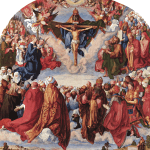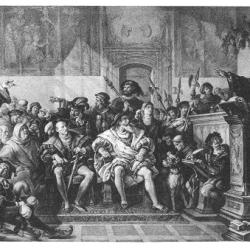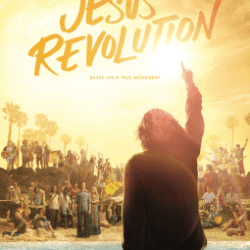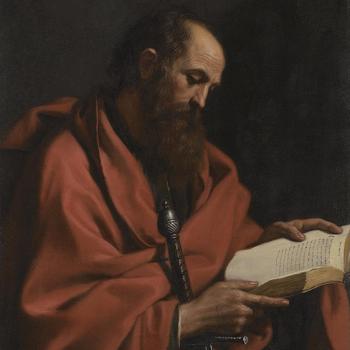
*****
When it comes to things like conversion (to Christ or to another faith community) it really comes down to faith. This is how conversion works. We are not computers or machines. We are whole people. Christianity is a faith, and requires faith to adopt (in whatever one of its brands). There is no avoiding this. One can never absolutely prove their system. That is not only true for Christianity but for any thought-system, in my opinion.
Faith is also a gift from God and is only received through grace (contra Pelagianism and a religion of works). I think there is a concept of a “reasonable faith” and I certainly seek to follow reason at every turn, because I don’t see that “irrational faith” does anyone any good. A lack of reason can be as harmful as a lack of faith.
Some people seem to think that Christianity and personal Christian faith are almost strictly matters of rationalism and making selections, much as one chooses a pair of shoes or what website to visit. This is sheer nonsense. They reduce Christianity to philosophy at various important points, which, to me, smacks of the Enlightenment and a sort of religion possessed by people like Jefferson or Voltaire.
People often seem to think I am a “rationalistic” sort myself. I certainly have that aspect in me to a large degree, yet when it comes my conversions, both to Christ and to the Catholic Church, reason was not the primary determinant. Rather, it was morality and ethics. I knew instinctively when I was 18 that Christianity was the Way, and possessed the true path of morality. I was also highly influenced by movies about Jesus, believe it or not, which is another completely different way of someone receiving Gospel Truth.
My Catholic conversion was begun over the issue of contraception – another moral issue – and also my admiration for the Catholic “holding the line” against divorce and abortion: positions I had arrived at as an evangelical. The issue of contraception is the last thing that lends itself to cool, dispassionate reasoning processes. It is a counter-intuitive thing to refrain from sexual relations with a wife that one loves, for very deep reasons of what it means to cherish life and respect it, and to respect the natural order. The mind can easily rationalize that away, and the passions mitigate against it.
But coming to the Catholic position on this (which is the historic position of all three branches of Christianity) is a matter of deep spirituality, not mere rationalism or the anti-rationalism of the passions and isolated emotional dynamics.
Conversion is an exceedingly complex process. I’m reminded of the ultra-simplistic thought of logical positivism. Recently I did some fascinating research on consciousness, the mind-body problem, and the philosophy of science. The dualists (more similar to traditional Christian thought) are, to me, far more satisfying intellectually and plausible. When one reads the analyses of Michael Polanyi, for example, it is obvious that there is no such thing as a completely objective individual setting out to determine what is “out there.”
Empiricism turns out to be just as complex as anything else. So those who think conversion is so simple and easily-explained remind me of a certain atheist materialist mindset where it is thought that those who don’t see this “simple truth” about science or the non-existence of God or the senses being our only means to knowledge, suffer from some huge, pitiable deficiency.
***
I think the more influential factor in the dynamics of conversion and the course of one’s spiritual journey is not Reformed vs. Arminian, but rather a full-bodied, nuanced, thoughtful, intelligent faith vs. a narrow, legalistic, anti-intellectual, a-historical fundamentalism. Both the Reformed and Arminian camps have both these parties, broadly speaking.
Certain “hyper-Calvinists” and various fundamentalist step-children, such as the numerous Baptist strains are that wing of the Reformed, whereas strains of isolated pentecostals, so-called “holiness” or other non-denominational minimalist groups comprise this wing amongst Arminians.
I would say this factor far outweighs simply being an Arminian or a Reformed prior to a conversion to Catholicism, because it comes down to, “what kind of Reformed/Arminian?” There are anti-Catholics and ecumenists in both camps as well.
Formerly, I was Arminian, ecumenical, and took both an intellectually- and historically-oriented approach to Christianity (because I got interested in apologetics in 1981), along with a strong biblicism (and also, by the way, an acceptance of the charismatic gifts and non-cessationism and openness to spiritual experience). I was influenced a great deal by the Reformed precisely because I was ecumenical and recognized truth wherever it could be found. I brought all that with me into the Catholic Church. In those respects I am little different than I ever was.
I was, however, on the other hand, very un-sacramental, un-liturgical, un-institutional, and with no inkling at all of Mariology before. That involved a huge change. But those with like or similar approaches to Christianity can easily adjust to becoming a Catholic, because many things remain the same.
For the Arminian or Reformed fundamentalist however, it can often be observed that they also take their emphases with them into the Catholic Church (or Orthodoxy, as the case may be). They often retain fundamentalist characteristics and are insufficiently converted. This is the case with many Catholic so-called “traditionalists” who were converts. They never properly learn how to think like a Catholic in the first place, so consequently they sometimes go off to the error of Catholic “traditionalism” because it is a hybrid of Protestantism (private judgment and individualism and a certain fundamentalist, exclusivistic outlook) and liberalism (pick-and-choose theology). Or a liberal Protestant who converts will naturally tend to gravitate to the liberal elements in the Catholic Church (not a difficult task to find, sadly).
We observe this in some converts to Orthodoxy as well. If they were anti-Catholic in their Protestant days, oftentimes they take that with them into Orthodoxy and continue the error and sin against charity (the schismatic mindset) there. But if they weren’t anti-Catholic before, then they won’t be later, as Orthodox. Thankfully, the latter are, I am told, the majority, though one wouldn’t know this, if they were only judging by the Orthodox one meets on the Internet.
Fundamentalists learn to think in a “black-and-white,” starkly dichotomizing, either/or mentality. It is not enough for them to examine an individual or their viewpoints individually. Everything is broad-brush, with frequent references to entire classes of people (“RC apologists,” “RC converts,” “most Catholics,” etc.). This is the prejudicial, suspicious sort of mentality. And it is pure fundamentalism.
Bottom line: we are what we eat. It is possible to grow out of earlier errors, but it is usually a long process, and some people never sufficiently analyze themselves enough to ever be able to change for the better, whether within a Protestant or Catholic framework. Both anti-Catholicism and fundamentalism are very tough to break out of completely.
Sometimes the anti-intellectual fundamentalist will go to the other extreme as they become more educated, absurdly adopting the opposite viewpoint of Enlightenment rationalism, thus minimizing the centrality of faith and mystery in Christianity to an unacceptable degree, even within a Protestant paradigm and conception of such things.
***
Development of doctrine is essentially a biblical idea. The Bible itself develops its theology. If some people insist on putting it into the Aristotelian box (if that makes them happy), fine, but that makes it no less biblical. Most Protestant apologists or theologians readily admit that, e.g., trinitarianism was a developing doctrine.
What is it in trinitarianism that develops? In other words, what is its essence? It’s essence is that there are Three Persons yet One God. There is nothing at all specifically or exclusively “Catholic” here. It’s not as if development is a philosophically foreign notion smuggled into Christianity from paganism by desperate Catholic special pleaders. Amateur and professional students of Church history simply disagree on what is a development and what is a corruption – not that development itself is a nonsensical or absurd concept from the get-go. What is the essence of the Two Natures of Christ? Jesus is both God and Man. Every later complex development, such as at the Council of Chalcedon in 451, flows from that premise or simple statement of that which was later worked out in the greatest detail.
***
I am an epistemological and philosophical eclectic – a mixed bag. I have elements of Plato, Aristotle, Pascal, nominalism, philosophical skepticism, phenomenology, even some Kierkegaardian existentialism, and lots of other stuff. I am certainly not a Thomist in my overall methodology. I am not simply a “rationalist,” as some Protestant apologists have lately claimed. Nor is Cardinal Newman’s theory of development (which has profoundly influenced my thought) “rationalistic” in the sense that it starts out with some type of Platonic essences or ideas in the mind and then fits the external world into those ideas.
Rather, it is empirical and starts out with the data of Church history (just as science starts out with the data of nature and natural facts). It then proposes a provisional hypothesis to explain these facts of Church history and organize them into a coherent “theory.” Not surprisingly, Newman thinks that the facts (by and large) fit into his theory without having to be forced into the theory by sophism and special pleading.
In the same manner, every Calvinist thinks that the biblical facts fit into the Calvinist theological schema or framework. Critics think that they force the Bible into a Calvinist mode and ignore anomalies. Everyone tends to think this about other peoples’ systems. So we would expect Calvinists to accuse Newman of “historical eisegesis,” so to speak. His is simply one way of viewing doctrinal history, and the role of faith must not be minimized, either.
Catholics (just like all Christians) believe things in faith, and don’t pretend to have knock-down answers for every difficulty. But so what? As I often note: Christianity is not philosophy. Protestants haven’t resolved all “Bible difficulties.” They write whole books about it (e.g., Gleason Archer: Encyclopedia of Bible Difficulties). The entire enterprise of biblical commentary and exegesis is one large attempt to work through longstanding difficulties in interpretation and theological synthesis.
Catholics believe that Tradition and Church History also make sense and that they are coherent and harmonious with Catholicism. This is partly based on reason and partly on faith, just as in the case of Protestant belief regarding the Bible.
The empirical evidence in Newman’s theory of development of doctrine is the mass of historical facts concerning what Christians (particularly the Fathers) in fact believed. To overthrow Newman’s theory, one merely has to present an alternative one which better explains these facts – best as we can ascertain them.
So, for example, Protestant apologists David T. King and William Webster write books purporting to prove that the Fathers believed in sola Scriptura. Catholics write books and papers trying to show the opposite. Both sides are appealing to what they deem to be the facts of history. The “objective” observer, then, can make up their own mind as to which side has a more plausible or believable case. I’m all for that. I think Catholics win hands-down, both in Christian history and in the Bible. No one ever accused me of lacking confidence in my position! These things can be demonstrated, and I think I have done so. And this is empiricism and falsifiability.
Every group thinks their view explains the Bible and/or history and that others get it wrong to more or less degrees. That’s a given. If someone doesn’t like Newman’s view of Church history, they can try to produce a better one. Christians have done “philosophy of history” ever since St. Augustine and his masterpiece, The City of God. There is nothing improper for John Henry Newman to have a theory of Church history, any more than for William Webster and David King to construct one from an opposing viewpoint. Churches do this; Church traditions do so. Many Protestants have an anti-Catholic, “massive apostasy” notion of the early Church. Others are far more sophisticated than that. Fundamentalists and Catholic “traditionalists” have conspiratorial notions of recent history, etc.
Some Protestants may think that King and Webster’s version of patristic doctrinal history fits the facts; I think Newman’s does. If someone doesn’t like Newman, then I encourage them to get to work and try to refute his arguments. If anyone attempts to do that, I will be right there with a comprehensive reply – all to be put on my website for outside inquirers to work through critically in their own minds. I will continue to believe what I do and defend it until shown a better alternative.
***
One Protestant apologist stated that a full-blooded belief in Catholicism (i.e., orthodoxy from a Catholic perspective) amounts to a “blindness to viable intellectual alternatives.” But how is it blind to alternatives to simply disagree with them? I find this a fascinating mentality. Is a Calvinist “blind” to Arminianism (which this Calvinist apologist recently claimed was scarcely Protestant, if at all) because he disagrees with it? Is a Calvinist blind to medieval eucharistic theology because he disagrees with it, or to St. Thomas’s five theistic arguments, because they may not find them compelling (I don’t, either, technically speaking)?
Catholics believe that Jesus established a certain form of Church and its government, including the papacy. So are we immediately intellectually dishonest or insufferably arrogant for simply so believing? In other words, so much of this line of sophisticated, subtly anti-Catholic rhetoric suggests to me that either I give up my Catholicism or else I have to be accused of being a dishonest simpleton who distorts history to his own ends, and who is impervious to facts because of an incorrigible “dogmatism” and Catholic “triumphalism.” That’s what it amounts to. And of course this is utterly unreasonable and unfair, and condescending of Catholics to boot.
***
Catholics actually believe in the (gasp!) papacy! But in some quarters this is considered insufferably arrogant. Catholics are supposed to be (when all is said and done) theological and ecclesiological relativists in order to be praised as “tolerant” and “open-minded.” Nevertheless, Catholics believe certain things in faith (so do Protestants) . . . Why this comes as such a shocking revelation and scandal to some folks is a thing I have never understood. After all, which is more tolerant?:
1) Catholics allowing Protestants to be Protestants in good faith (while disagreeing with them) and Protestants allowing Catholics to be Catholics in good faith (while disagreeing with them), without charges of inherent dishonesty or head-in-the-sand anti-intellectualism, or other foolishness,
or:
2) One side demanding that the other be like them in certain respects (i.e., usually giving up their distinctives – the very thing that makes them what they are) to even be granted a seat at the “table” of “intelligent, open-minded” Christian discussion?
Ecumenism and fellowship with our Christian brethren is not at all inconsistent with apologetics or belief in one’s own system.
***
Division among Christians is the devil’s very greatest accomplishment and victory, in my opinion. What could be better for his purposes than to divide Christians – the very force which is his greatest enemy in this world – to such an extent that their effectiveness in proclaiming the gospel and making a difference in the world is substantially minimized (perhaps even neutralized in some respects)?
What could be better from Satan’s perspective than a scenario where this tremendous spiritual army (like the hordes at Babel) spends much more time shooting at each other than at the forces of evil? Nothing makes a general more ecstatic than civil war or other sorts of division in the ranks of his enemy.
Even atheists or the ACLU or the pro-aborts or terrorists have infinitely more unity for their cause than we silly and arrogant Christians do, who not only fall short with regard to rudimentary civility, charity, and courtesy, but blatantly disregard our Lord’s own commands to love one another as He has loved us, so that the world would know that the Father sent the Son, and to do good, especially to those in the household of faith, and the Apostle Paul’s repeated pleas for no divisions or schism.
I think it is an absolute disgrace and an abomination. We all need to get on our knees, repent, and cry out to God to find out what we as individuals can do to try to make a difference in this sad situation, by God’s grace.
***
(originally 5-13-03)
Photo credit: Image by 3dman_eu / (6-16-13) [Pixabay / CC0 Creative Commons license]
***

















